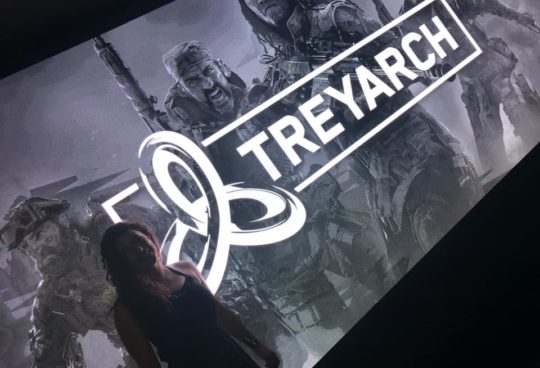Ashley Stang, from St. Petersburg College in Florida, interviewed myself and a few other developers on what it is like to work in games, and how we got there. Her entire essay will be out soon, but for now, here is my interview. Thanks, Ashley!
How did you get your diploma/degree? How long did you take to get it? Was this easy? Hard?
I took my degree (Bachelor of Design in Games) at RMIT University, which I obtained through portfolio application and interview. The application was relatively easy, since I had already been making game fan art as a teenager, and the interview was centered around what games I loved, what I considered good design, which game characters made strong protagonists, etc., all which I had answers for. The degree was 3 years, and challenging, but because I loved what I was doing I found it to be easy despite those challenges.
What are your daily responsibilities? Which do you like most? What do you like about them? What do you dislike about them?
As a producer, I am responsible for three of the studio teams, and am required to do daily stand-ups with the respective team leads, update the production tool program with appropriate tasks and bugs, and sit in on leads meetings to ensure smooth direction of the game. I like to interact with my teams most, because the feeling that I am assisting them in making their work easier is gratifying. I am always on my feet and walking around the studio. I dislike long meetings the most – the ones that go for longer than an hour – because a) they are boring, b) it usually means there is a problem that needs an intense conversation, c) it stops actual work from moving along.
How was the job hunt? How did you do? Would you think it’s harder to do today, in the present? Easier?
The job hunt wasn’t easy, and for the first year out of my degree I was seriously doubting my chances of success. I managed to get a job at Disney in an unrelated field (not games), so having that brand name on my resume was lucky for me (even though I had never worked on a game). I did find that my job today came from all the networking I did over the past 3 years after my degree, and every person I spoke to and the advice they offered eventually culminated into my current position. I believe it gets harder every day for students to get a job in games, as more students are graduating and saturating the number of applicants for jobs that don’t exist (or there are not enough of).
What advice would you give to me, a student that dreams to write/produce games, to get through college and really make it into the world of design?
It’s all about the networking now that gets an applicant through the door above the rest. Of course, continue to work on your portfolio – you should be doing that anyway – but don’t assume that there isn’t someone out in the world who is ten times better than you. There likely is. There are always students who are working as hard as you are, or even more so. That doesn’t mean that you aren’t good enough. It means that your skill may or may not be enough to get your voice heard over the saturated crowd of applicants. Start attending events and conferences and meet people. Let them see who you are as a person. You could have all the skill in the world, but that won’t account for anything if you can’t work with others in a team. Prove that you can do that. Make friends with developers just to learn and know who is who, not necessarily to get a job. In fact, someone will likely recommend you more after they have known you for a period of time, rather than on the first day you meet, because it’s hard to vouch for anyone’s skills initially.
What was the hardest part of obtaining your career? Hardest part of sustaining it?
The hardest part of obtaining my career was breaking that ice initially – when you try to start to make friends and create a small network for yourself. However, once that ice is broken, you would be amazed at how quickly your network will grow, as friends start introducing their friends and you begin to realize that a lot of people know each other in the industry. The hardest part of sustaining that network is to always check-in with those people and continue remaining in contact with them – you don’t want to fall off the grid, but you don’t want to always be around and annoy someone either. In terms of your skill level, you should always continue learning and pushing yourself to do more, because even after you secure your job and your network, there could always be fresh blood who is more skilled or more connected, ready to take that from you. Make sure you are always adding value to your studio, your career, and your friends.
Would you call this a “play hard, work harder” profession, or “work is play”? Would you have to have certain interests/skills? What are they?
In some respects, it is a “play hard, work harder” profession, and those who tell you otherwise are likely in a rare and lucky position of job security. The games industry is never secure, and you only need to take a look at the yearly reports of layoffs and cancelled games to see that truth. You need to work very hard to keep your career going, and to prove to everyone else in your studio that you are pulling your weight and deserve to be there. You can never be assured that you will be in the same studio forever, and most likely you will move around multiple times. Therefore, you should always be working hard to better yourself and be prepared for even the worst situation. Staying on top of the industry in terms of news, other studios, new games, new technology, etc. will allow you to stay relevant and knowledgeable. Taking on new skills in other departments, like learning coding or trying out the latest Unreal, for example, will also be a big help and add that value to you along the way.
Would you say that the whole process of your career (school, job hunt, workplace) is difficult? If 1 was very easy and 10 was very hard, where was it for you?
It was very difficult to start, but has become easier now that I have a job. Granted, I had to move countries to get a job, which is a separate issue altogether and one which causes great difficulty. I cannot speak for what the future will hold, but I have faith that the worst part of the hunt is over for me, because now I have enough people who will offer their support in a heartbeat if I asked. However, looking back, I think my difficulty level was about a 6.
What is definitely required to obtain a career in this field?
Now, you need people’s skills for sure. If you are a genius in your field, then studios may overlook your social skills, but if you can’t work with other people, take constructive criticism, listen to the opinions of others, and collaborate towards making a game, then your skills won’t shine nearly as bright. For a producer, empathy and listening is key, especially when dealing with conflict.
Are there any future requirements a student should be aware of? (Future diploma changes, background requirements, etc.)
I think more schools may be leaning towards offering more programming classes, because it diversifies a student’s skills, allows them to assist different teams (you don’t have to be a programmer to help with some of the programming, especially if you are a designer), and even better prepares them for making their own prototypes for their portfolios.
What extra-curricular class types do you think are helpful to support this career on a knowledge basis? (I.e, japanese, psychology, arts, chorus/band, etc.)
I took Japanese, but nothing else. The only other language I can think of is maybe French (Ubisoft?). I don’t know if being in a band would help, but if you are multi-talented, then it shows your ambition and dedication towards learning and trying new things. That’s a plus in any industry. Also, taking art classes if you are more design-inclined, or taking programming classes if you are art-inclined, is definitely recommended.
Do you see this being a long chapter of your life, or a short one? Does it require years to be worth it, or does it contain immediate benefits?
I see this being a long chapter. A head’s up – you aren’t going to be making amazing dollars in this industry, it is certainly a passion career. Which means you probably will retire late, go into another career, or get lucky and become an executive in a large studio (and never work in development again). It contains immediate benefits if this is a career that you know you love and will always want to work in, but if big perks and lavish vacations are more your thing, probably better to go get an MBA and work in finance. Side note: if your studio really takes off and you find yourself travelling the world promoting your latest game, or doing talks at conventions, then hey, you’re a winner.
Is this an occupation that’s difficult to manage a family life? Friends? Pets?
Because I left friends, home, and family, and moved overseas to get my job, I am very biased to say a resounding YES. I did sacrifice a lot to follow my dream, and had to grow up very quickly straight out of my degree. Now, I feel like I can spend some of my spare time with my boyfriend and close friends. A word of warning: I can’t say the same thing for crunch time – that’s a whole different kind of hell.
Out of 7 days a week, how many hours are you working? In a 24-hour period?
40 in a week. Except crunch periods. Then the number goes to infinity and breaks the clock.




Recent Comments